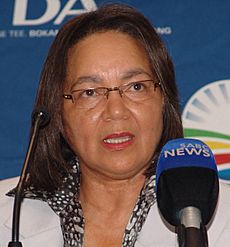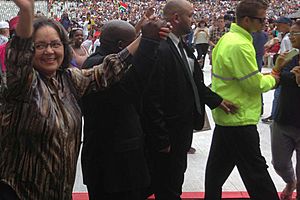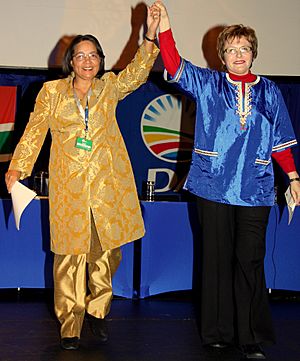Patricia de Lille facts for kids
Quick facts for kids
Patricia de Lille
|
|
|---|---|
 |
|
| Minister of Tourism | |
| Assumed office 6 March 2023 |
|
| President | Cyril Ramaphosa |
| Deputy | Fish Mahlalela Maggie Sotyu |
| Preceded by | Lindiwe Sisulu |
| Minister of Public Works and Infrastructure | |
| In office 30 May 2019 – 6 March 2023 |
|
| President | Cyril Ramaphosa |
| Deputy | Noxolo Kiviet |
| Preceded by | Position established |
| Succeeded by | Sihle Zikalala |
| Leader of Good | |
| Assumed office 2 December 2018 |
|
| Preceded by | Party founded |
| Member of the National Assembly of South Africa | |
| Assumed office 22 May 2019 |
|
| In office 10 May 1994 – 10 September 2010 |
|
| Mayor of Cape Town | |
| In office 1 June 2011 – 31 October 2018 Mayorship suspended: 8–15 May 2018 |
|
| Deputy | Ian Neilson |
| Preceded by | Dan Plato |
| Succeeded by | Ian Neilson (acting) Dan Plato |
| Western Cape Provincial Minister of Social Development | |
| In office 22 September 2010 – 31 May 2011 |
|
| Premier | Helen Zille |
| Preceded by | Ivan Meyer |
| Succeeded by | Albert Fritz |
| Leader of the Independent Democrats | |
| In office 21 June 2003 – 21 May 2014 |
|
| Preceded by | Party founded |
| Succeeded by | Party merged into Democratic Alliance |
| Member of the Western Cape Provincial Parliament | |
| In office 22 September 2010 – 31 May 2011 |
|
| Provincial Leader of the Democratic Alliance in the Western Cape |
|
| In office 18 April 2015 – 1 February 2017 |
|
| Deputy | Bonginkosi Madikizela |
| Preceded by | Ivan Meyer |
| Succeeded by | Bonginkosi Madikizela |
| Personal details | |
| Born |
Patricia Lindt
17 February 1951 Beaufort West, Cape Province, Union of South Africa |
| Political party | Good (2018–present) |
| Other political affiliations |
|
| Spouse |
Edwin de Lille
(m. 1972; died 2021) |
| Relations | Sarah Paulse (sister) |
| Children | 1 |
| Occupation |
|
| Profession | Chemical technologist |
Patricia de Lille (born 17 February 1951) is a well-known South African politician. She is currently the Minister of Tourism and leads her own political party called Good. Before this, she was the Minister of Public Works and Infrastructure from 2019 to 2023.
Patricia de Lille was also the Mayor of Cape Town from 2011 to 2018. Before becoming mayor, she served as the Western Cape Provincial Minister of Social Development from 2010 to 2011. She started her own political party, the Independent Democrats (ID), in 2003. This happened after she left the Pan Africanist Congress (PAC). In 2010, the ID joined with the Democratic Alliance, which is a big opposition party in South Africa. The ID officially closed down in 2014. From 2015 to 2017, she was the leader of the Democratic Alliance in the Western Cape province.
She was chosen to be the Democratic Alliance's candidate for Mayor of Cape Town in 2011. She won the election and became mayor. She was re-elected for a second term in 2016. Patricia de Lille was voted 22nd in the Top 100 Great South Africans. She is also known for her role in looking into the country's Arms Deal.
In May 2018, her membership with the Democratic Alliance was ended, which meant she could no longer be the mayor. However, a court temporarily stopped this. In August 2018, she announced she would resign as Mayor of Cape Town. She officially left her role and the Democratic Alliance on 31 October 2018.
After leaving, she started the Good party in December 2018. In February 2019, she was announced as the party's candidate for Western Cape Premier. She was elected to Parliament in May 2019. On 29 May 2019, President Cyril Ramaphosa appointed her as Minister of Public Works and Infrastructure. In March 2023, she became the Minister of Tourism and was reappointed to this role in June 2024.
Contents
Early Life and Career
Patricia de Lille was born in 1951 in Beaufort West, South Africa. She went to Bastiaanse Hoërskool. In 1974, she started working as a laboratory technician at a factory. She worked for the same company until 1990.
During her time at the factory, she became very involved in the South African Chemical Workers Union. She started as a shop steward, which is a representative for workers. Then she became a regional secretary. In 1983, she was elected as a National Executive Member. In 1988, she became the National Vice-President of The National Council of Trade Unions (NACTU). This was the highest position a woman had held in the trade union movement at that time.
Starting in Politics
In 1989, Patricia de Lille was elected to the National Executive Committee of the Pan Africanist Movement (PAM). She was part of the group that led important talks about the country's new laws before South Africa's first democratic election in 1994.
After being elected as a Member of Parliament (MP) for the Pan Africanist Congress (PAC), she became the Chairperson of the Parliamentary Committee on Transport from 1994 to 1999. She also worked on many other important committees. These included committees for Health, Minerals and Energy, Trade and Industry, and Communications.
Later, she used her position in Parliament to speak out about the South African Arms Deal. She shared information about this deal, which involved the government buying weapons.
In 2003, De Lille decided to leave the PAC and start her own political party. She named it the Independent Democrats.
Important Work
Investigating the Arms Deal
Patricia de Lille was a key person who called for an investigation into the South African Arms Deal. This deal involved the government buying weapons from European companies. She believed there might have been corruption involved. The government did not agree to her request for an independent investigation.
De Lille said that some people accused her of being unpatriotic because she tried to investigate the Arms Deal. She felt that her efforts to find out the truth were seen as embarrassing the country.
In 2009, De Lille shared her thoughts about the investigation into the Arms Deal. She wrote that she was upset because she felt the government was not respecting the country's Constitution and laws. She believed that letting people who broke the law go unpunished would send the wrong message to the public.
Awards and Achievements
Patricia de Lille has received several awards and recognitions for her work. She was given the Freedom of the City of Birmingham, Alabama, in the United States. In 2004, she was named one of the Top 5 Women in Government and Government Agencies. She also received the 2004 Old Mutual South African Leadership Award in the category of Woman Leadership.
She was voted 22nd in the Top 100 Great South Africans. Her role in investigating the South African Arms Deal is one of her notable achievements.
In July 2006, she became the first woman to be recognized as Honorary Colonel of 84 Signal Unit in the South African National Defence Force. In August 2006, she received an award from City Press and Rapport Newspaper as one of the top 10 women in South Africa. A survey in 2004 found that De Lille was South Africa's favourite politician after Thabo Mbeki.
Joining the Democratic Alliance
On 13 August 2010, after discussions, it was decided that the Independent Democrats (ID) would join with the Democratic Alliance (DA). On 15 August 2010, Patricia de Lille and DA Leader Helen Zille publicly announced that the ID would merge with the DA.
Challenges as Mayor
In September 2017, Patricia de Lille faced some challenges during her time as Mayor of Cape Town. She ordered the closure of the city's special investigations unit. This decision was against the wishes of another city official. The closure led to claims that she had improperly benefited from security upgrades at her home. However, these claims were investigated by the auditor-general and found to be untrue.
After the unit was closed, the working relationship between De Lille and another official became difficult. The Democratic Alliance then accused De Lille of misconduct.
In February 2018, she faced a vote of no confidence, which means people voted on whether she should remain mayor. She survived the vote by just one vote. Later, in April 2018, most of the DA councillors voted for her removal as mayor.
On 8 May 2018, the DA ended De Lille's party membership. This meant she could no longer be the mayor of Cape Town. However, the Western Cape High Court temporarily stopped her removal. On 27 June 2018, the court decided to give De Lille her party membership back. The court found that the DA had not followed its own rules when it removed her.
On 5 August 2018, Patricia de Lille and the DA leader, Mmusi Maimane, announced that they had reached an agreement. De Lille would resign as Mayor of Cape Town, and the party would drop all internal charges against her. She officially left office on 31 October 2018. At the same time, she also resigned as a member of the Democratic Alliance.
Leading the Good Party and National Role
After resigning as Mayor of Cape Town, Patricia de Lille took a short break from public life. On 18 November 2018, she launched a new political movement called "For Good." She announced that she would form a new political party.
On 2 December 2018, De Lille officially announced the creation of her new political party, named Good. Other former Democratic Alliance members joined her. She also confirmed that the party was registered and would take part in the 2019 general election.
In February 2019, De Lille was announced as the Good Party's candidate for Western Cape Premier. She officially launched her campaign in Wesbank, near Delft, outside Cape Town.
After the May 2019 general elections, Patricia de Lille became a Member of the National Assembly of South Africa. President Cyril Ramaphosa then appointed her as Minister of Public Works and Infrastructure.
In March 2023, during a change in the cabinet, President Cyril Ramaphosa appointed her as Minister of Tourism. In the 2024 general election, the Good party won one seat in Parliament, and Patricia de Lille was the only elected MP for Good. In June 2024, the Good party agreed to join the government of national unity led by the ANC. Patricia de Lille continued her role as Minister of Tourism in this new government.
Family Life
Patricia de Lille's husband, Edwin, passed away on 7 February 2021, after a long illness. They were married for 49 years and had one son named Allistair.
See also
 In Spanish: Patricia de Lille para niños
In Spanish: Patricia de Lille para niños
 | Mary Eliza Mahoney |
 | Susie King Taylor |
 | Ida Gray |
 | Eliza Ann Grier |



